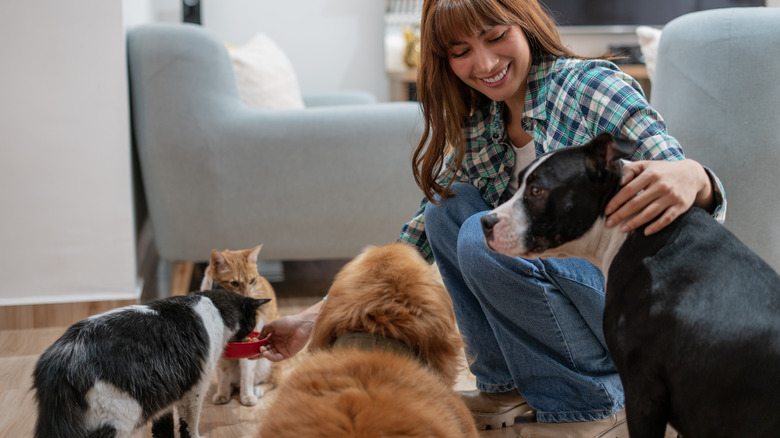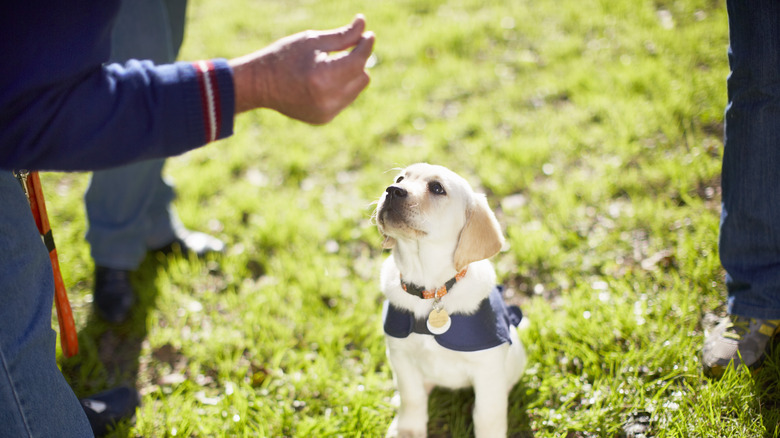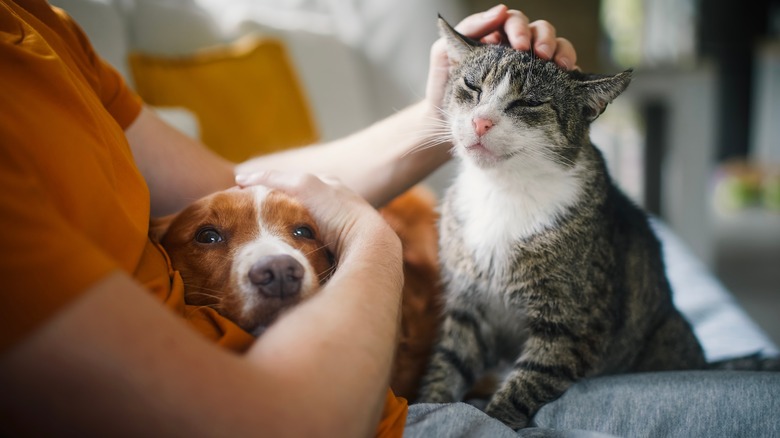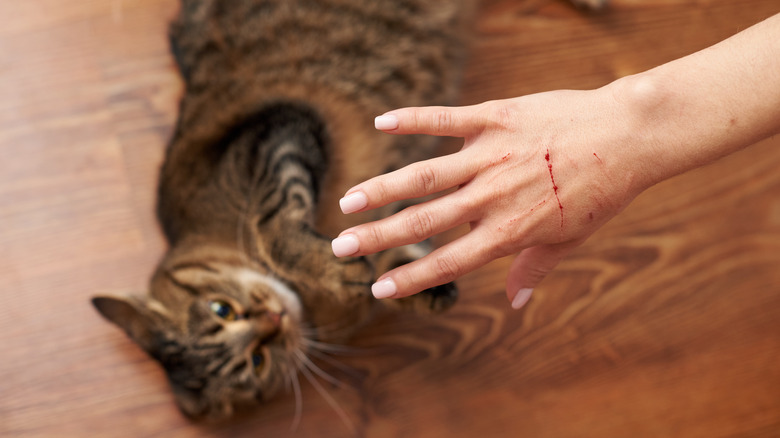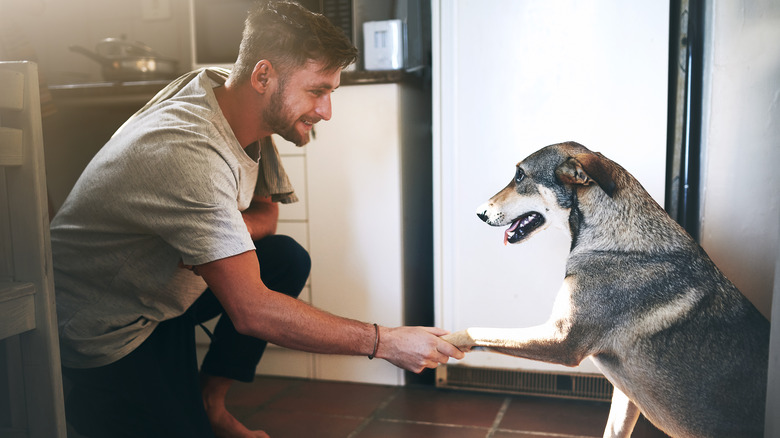Questions To Ask Your Pet Sitter Before Giving Them The Job
Not everyone has the luxury of having a relative or friend who's always willing and available to watch their pet while they're away, free of charge. And boarding isn't exactly an ideal option. This is why many people hire sitters. You can find one on a site like Rover, Care, or Petsit. Some sitters also promote their services on social media without a third party to take a cut of the proceeds. Regardless of how you find your sitter, it's important to ask questions about their experience, training, current pets, insurance, and willingness to meet in advance.
Answers to some of these questions may already be included in the sitter's online profile or social media ad, but it doesn't hurt to get a more in-depth response via an interview. You can present your inquiries via email, social media, text, or over the phone, depending on your preference and that of the sitter. Many pet parents prefer to meet a prospective sitter in person or via video conferencing (Zoom, etc.) before hiring them, so these could be options for the interview as well.
Of course, just like any other loving pet parent, you want to ensure your companion will be well-cared for by someone trustworthy. You want peace of mind while you're away without worrisome thoughts. Getting answers to these questions can help you have that peace of mind.
How much pet experience do you have?
Most pet sitters have experience with caring for their own pet, but caring for someone else's pet can be a bit different. You might prefer hiring someone who's watched a stranger's pets before, since this could equate to being more prepared to handle unexpected circumstances that may arise while sitting for you. Unplanned situations that a sitter might encounter include dealing with a sick or injured pet, cleaning up after an indoor bowel movement, or handling a shy or frightened pet.
You may also want to ask if the sitter has any experience with a specific species or breed. This is especially important if you have a very large dog, a playful cat with claws, or a less-common species with special needs. Or perhaps you have a pet that takes pills, and you prefer to hire a sitter who knows how to administer medication, even if it means simply wrapping it in cheese.
If prior pet-sitting experience isn't important to you, but pet interactions are, ask about the different pets the person has been around over the years. These interactions could range from owning a pet to volunteering or working at a pet shelter or being around friends' or family members' pets, or working at a pet store.
Do you have any specific training?
Some individuals' interactions with pets goes far beyond just caring for them in a home. Some sitters have training or certifications in a specific area, which could indicate commitment to pet care and level of qualification to look after your companion. Of course, finding someone who has specific training or certification could mean they'll expect more pay for their sitting services, so this is something to keep in mind during your search.
If you have a puppy that hasn't yet learned basic commands, you might prefer a certified professional dog trainer who has interacted with unruly canines like yours, and has developed patience as a result. Or perhaps your feline friend has aggressive tendencies that could have landed them on an episode of "My Cat from Hell." In this case, you may need a sitter who's a skilled and experienced cat behaviorist like Jackson Galaxy.
Another area of training you might want to ask about is first aid. We all hope it never happens, but accidents involving our pets can occur when we're not home. With this in mind, you may want to hire a sitter who's cared for an injured pet before, and isn't afraid to deal with a crisis or other results of an injury.
Do you currently have any pets?
Finding someone with pet-sitting experience is important to many pet owners, but what you may find equally important is whether the sitter you're interviewing has any current pets. If they do, you might consider this a good thing, since it could imply that the individual is responsible and knows what it takes to care for a pet, especially if they've shared their home with a pet for many years.
On the other hand, you might learn something not-so-positive about the sitter after hearing about their pets. When you ask about their pets, pay attention to their body language. Do they light up when they talk about them? Are they willing to share any funny stories about or photos of them? Ask where their pet spends most of their time or how often they get walked (if they own a dog). Try to get a sense of their relationship with their companion from their responses, since owning a pet doesn't automatically make someone a good sitter.
Another thing to consider is the potential disadvantage if you choose to hire a sitter with their own pets. If the sitter spends a lot of time with their pet, they will likely carry their scent on their clothing or shoes. If your pet doesn't like smelling another animal on you, they might be uncomfortable or distressed.
Are you insured?
Accidents happen. That's why insurance exists. You probably have a policy on your vehicle, so if you were to get into a fender bender, your car and medical expenses would be covered. But what if an incident happens that involves your pet and the sitter, resulting in a trip to the emergency room? Or what if the sitter inadvertently damages your property? This is where having pet sitter insurance comes in handy.
Insurance covers bites or other injuries resulting in medical care that a sitter might sustain while caring for your pet. Or, if your pet were to sustain injuries and had to be taken to a veterinary facility for care, the insurance would cover that as well. By the way, the percentage and terms of coverage varies from company to company.
Pet sitter insurance can also cover damage to your home if a sitter were to accidentally break something like a vase, kitchenware, or maybe an expensive pet item, such as that self-cleaning litter box you love to use. Another bonus is that when a sitter is insured, they might be more likely to confess a mishap, if one were to occur.
Are you willing to meet my pet ahead of time?
Your Rottweiler might be the sweetest, friendliest dog when you're in the room, but that might not be the case when you're not around. What if they dislike the sitter or become aggressive when they see them walk into your home? Or what if the sitter becomes frightened of your sizable 75-pound Labradoodle because they envisioned them a bit smaller? No one wants their pet's first encounter with a sitter to be negative, but an encounter that occurs when the owner isn't home is even worse.
Sharing photos, videos, and a description of your pet with a prospective sitter is a great idea. However, a face-to-face meeting is the only way to gauge how your pet will respond to the sitter and vice versa. Plus, this meeting gives your pet the opportunity to get familiar with the sitter's scent and face before they enter your home alone for the first time. Keep in mind that this initial meeting doesn't have to take place in your home; you can arrange a rendezvous at a park if you or the sitter are more comfortable with that.
Asking these questions, among others, gives you valuable information that will help you make a decision on whether or not to hire a sitter. You might discover a deal breaker with a specific answer or after the initial meetup, and that's why interviewing the sitter is so important; you want someone who will be a good match for your companion who will take good care of them while you're away.
